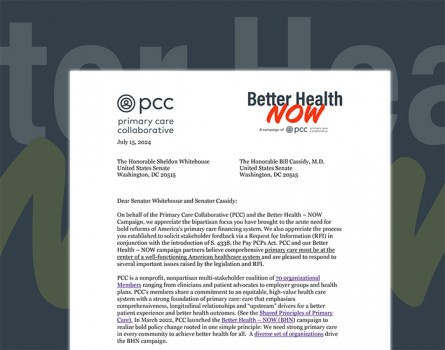You are looking at an archived version of our site. Please visit thepcc.org for a fresh, new experience!
You are here: Array » Better Health - NOW Re ...
Better Health - NOW Replies to RFI on Pay PCPs Act
The Primary Care Collaborative and our Better Health - NOW partners have responded to the Request For Information process set out by Senators Whitehouse and Cassidy in response to their introduction of S.4338, the Pay PCPs Act, which seeks to create a hybrid payment system for primary care inside of Medicare Part B. For PCC and our Members, primary care should be at the very center of a well-functioning American health care system.
The evidence is crystal clear that primary care reform can unlock both powerful improvements in patient health and real cost savings. Major studies have shown that high-quality, comprehensive primary care is an essential component of any national strategy to address chronic physical and mental health conditions and the constant, unaffordable costs they generate.
That is why our Better Health – NOW Campaign supports efforts to rapidly transition primary care payment from a fee-for-service (FFS) approach to one based upon prospective population-based payment (hybrid) models which include upfront and ongoing investments, as well as guardrails to assure quality and access in both rural and underserved communities.
As the Senators suggest in their legislation, structural reforms of Medicare payment being debated in the Finance Committee must be accompanied by hybrid payment paradigms for primary care. As work proceeds on this broader package, the zero-sum budget neutrality requirements applicable to the Physician Fee Schedule should not be allowed to undermine the scope and viability of substantial reforms to Part B payment with primary care at the center.
Our RFI response to Senators Whitehouse and Cassidy outlines 6 principles which a primary care hybrid payment paradigm should reflect. We also say that, at a minimum, any legislation creating a hybrid payment structure should include patient cost-sharing waivers which is key to removing barriers to care. Remember, primary care is the only part of the health system where additional resources lower costs - to people, to taxpayers and to families.
Today, a vicious cycle of foregoing preventive care, resulting in unnecessary ED visits, and ultimately avoidable hospitalizations end up degrading beneficiaries' health and eroding the fiscal solvency of Medicare. Access to primary care can reverse this pattern and both hybrid payment and cost-sharing reductions can help with these long-term structural problems.
When it comes down to it, payment policies supporting comprehensive primary care, including the integration of behavioral health, are an important step toward strengthening primary care for all Americans. We look forward to continuing to work with Senators Whitehouse and Cassidy, their colleagues and Members of both sides of the aisle to bring deeper and smarter investment to the front door of America's health care system.
| Attachment | Size |
|---|---|
| 315.43 KB |
Recent News
August 16, 2024
August 12, 2024
July 16, 2024
Statement from @AnnGreiner1: "Today’s new @CMSinnovates announcement is a promising step forward for #primarycare p… https://t.co/A6l5Rt9Fzb —
2 years 6 months ago
RT @LarryMcNeely1: @brookslasure says #primarycare relationship is foundation of care...announcing the "Making Care Primary" model from @C… —
2 years 6 months ago
RT @LarryMcNeely1: stressing alignment w Medicaid. 8 States participating including CO, NM, MA. —
2 years 6 months ago
Secondary menu
Copyright © 2024 Primary Care Collaborative




